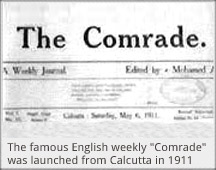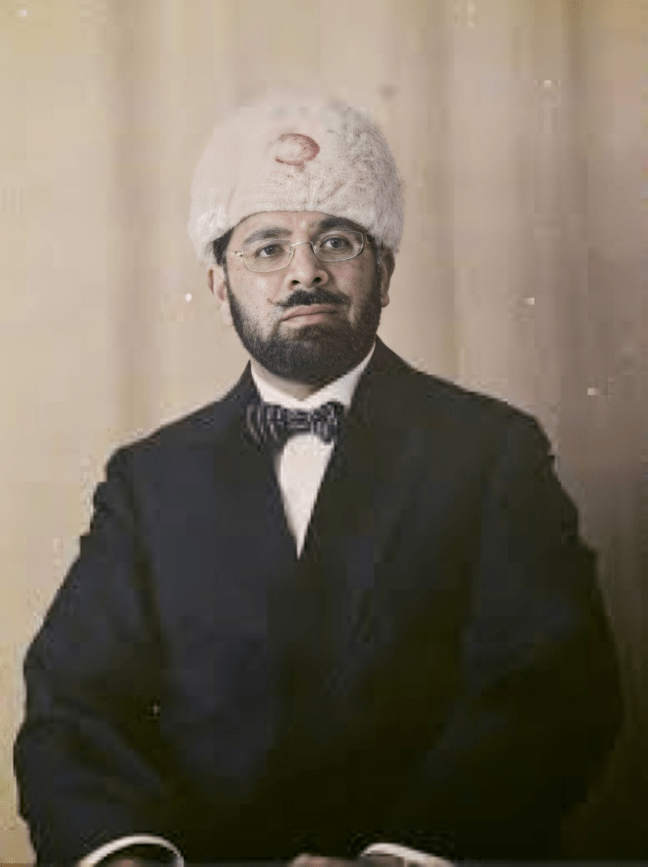Maulana Muhammad Ali was born in Rampur state in 1878, in a wealthy and enlightened family of Pathans. His father died when he was two years old. He and his family suffered financial problems after the death of his father. Due to the efforts, determination and sacrifice by his mother, he and his brothers were able to get good education. He did his graduation from Aligarh University with honors and then went to Lincoln College Oxford, England, in 1898 to study modern history.
 On his return he was appointed Director of Education in Rampur State, and later joined the Baroda Civil Service and served there for seven years. Maulana Muhammad Ali was a brilliant and impressive writer, an orator of the first magnitude and a farsighted political leader. He wrote articles in various newspapers like “The Times”, “The Observer” and “The Manchester Guardian”. Maulana Muhammad Ali wrote both in English and Urdu. He launched his famous English weekly “Comrade” from Calcutta in 1911. After shifting to Delhi in 1913, he, in addition to his English weekly, also launched his Urdu weekly, “Hamdard”. The “Comrade” became an internationally famous journal and secured many subscribers in numerous foreign countries. He also worked hard towards making M. O. A. College a Muslim University. He assisted in setting up Jami’ah Milliyah Islamia, which was later transferred to Delhi. For four years after 1911, he remained involved in the Kanpur Mosque affair. Maulana Muhammad Ali Jouhar was one of the cofounders of All India Muslim League. He attended the first session of All India Muslim League at Dhaka in 1906, and was later elected as its President in 1918. He remained active in the affairs of the All India Muslim League till 1928.
On his return he was appointed Director of Education in Rampur State, and later joined the Baroda Civil Service and served there for seven years. Maulana Muhammad Ali was a brilliant and impressive writer, an orator of the first magnitude and a farsighted political leader. He wrote articles in various newspapers like “The Times”, “The Observer” and “The Manchester Guardian”. Maulana Muhammad Ali wrote both in English and Urdu. He launched his famous English weekly “Comrade” from Calcutta in 1911. After shifting to Delhi in 1913, he, in addition to his English weekly, also launched his Urdu weekly, “Hamdard”. The “Comrade” became an internationally famous journal and secured many subscribers in numerous foreign countries. He also worked hard towards making M. O. A. College a Muslim University. He assisted in setting up Jami’ah Milliyah Islamia, which was later transferred to Delhi. For four years after 1911, he remained involved in the Kanpur Mosque affair. Maulana Muhammad Ali Jouhar was one of the cofounders of All India Muslim League. He attended the first session of All India Muslim League at Dhaka in 1906, and was later elected as its President in 1918. He remained active in the affairs of the All India Muslim League till 1928.
During the Khilafat Movement, Maulana Muhammad Ali Jouhar led a delegation to England in 1919, in order to present the view of the Muslims. Although the delegation was not successful in its aim, he still kept on working for the Muslims. He also wholeheartedly joined the non-cooperation movement organized by Gandhi. In 1921, after the British refused to honor their promises in regard to Turkey, he toured the whole of India in order to gather support for the success of the non-cooperation movement. At the end of the movement he was arrested and jailed for two years.
In 1924, he renewed the publication of “Hamdard”. In 1928, he left the Indian National Congress, opposed the Nehru Report tooth and nail, and supported the Fourteen Points of Quaid-i-Azam. Despite his ill health, he attended the First Round Table Conference in 1930, where he effectively argued the case of the Indian Muslims. He delivered a memorable, fiery speech against the domination of India and in favor of immediate independence. Soon after the first session was over, he collapsed and died in London on January 4, 1931, and was buried in Jerusalem according to his own wish.
This article was last updated on Sunday, June 01, 2003






